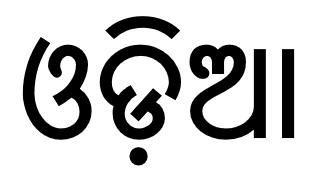
Odia is an Indo-Aryan classical spoken in the Indian state of Odisha. It is the official language in Odisha, where native speakers make up 82% of the population, and it is also spoken in parts of West Bengal, Jharkhand, Andhra Pradesh and Chhattisgarh. Odia is one of the many official languages of India; it is the official language of Odisha and the second official language of Jharkhand.

Ganjam district is a district in the Indian state of Odisha. Ganjam's total area is 8,206 km² (3,168 mi²). The district headquarters is Chhatrapur. Ganjam is divided into three sub-divisions Chhatrapur, Berhampur, and Bhanjanagar. The Imperial Gazetteer of India 1908 lists Ganjam, along with the Thanjavur and South Canara districts, as the three districts of the Madras Presidency where Brahmins were most numerous. As of 2011 it is the most populous district of Odisha.
Das is a common last name in South Asia, among adherents of Hinduism and Sikhism, as well as those who converted to Islam or Christianity. It is a derived from the Sanskrit word Dasa meaning servant, devotee, or votary. "Das" may be inferred to be one who has surrendered to God. The surname is often used by those in the Vaishnav community.
The Odia (ଓଡ଼ିଆ), formerly spelled Oriya, are an Indo-Aryan ethnic group native to the Indian state of Odisha who speak the Odia language. They constitute a majority in the eastern coastal state, with significant minority populations existing in the neighboring states of Andhra Pradesh, Chhattisgarh, Jharkhand and West Bengal.

Manoj Das was an Indian author who wrote in Odia and English. In 2000, Manoj Das was awarded the Saraswati Samman. He was awarded Padma Shri in 2001, the fourth-highest Civilian Award in India, and Padma Bhusan in 2020, the third-highest Civilian Award in India for his contribution to the field of Literature & Education.

Biswambhar Parida was an Indian Freedom fighter who was born in Jagatsinghpur District in Indian state of Odisha. He plunged into Indian Independence Movement at a very early age, was a devout follower of Gandhian Freedom Movement and was imprisoned for around two years. He got himself involved in many social, literary and organizational activities among his in-mates and fellow Freedom Fighters, while being at Berhampur Prison.

Gopabandhu Das (1877–1928), popularly known as Utkalamani Gopabandhu Das, was a social worker, reformer, political activist, journalist, poet and essayist.
Odisha is one of the 28 states of India, located on the eastern coast. It is surrounded by the states of West Bengal to the northeast, Jharkhand to the north, Chhattisgarh to the west and northwest, and Andhra Pradesh to the south and southwest. Odia is the official and most widely spoken language, spoken by 33.2 million according to the 2001 Census. The modern state of Odisha was established on 1 April 1936, as a province in British India, and consisted predominantly of Odia-speaking regions. April 1 is celebrated as Odisha Day.

Pandit Nilakantha Das (1884-1967) was one of the most illustrious sons of Odisha, who appeared both in its political and literary arena at the most crucial period of its history, when Odisha had no political identity in the map of India, and Odia as a language was about to be extinct. He worked relentlessly for Odisha's recognition both politically and linguistically, and helped bring to fruition the dreams of Utkala Gaurab Madhusudan Das, Utkalamani Gopabandhu Das and all other Odia loving people.
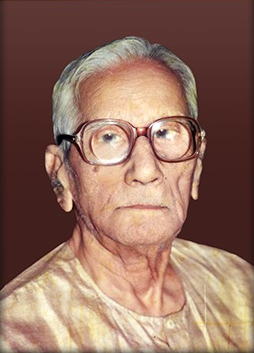
Dr. Radhanath Rath was a newspaper editor, freedom fighter, social worker and politician from Odisha. He was the editor of The Samaja, one of the leading newspapers of Odisha.

Binod Kanungo (1912–1990) was an Odia author, freedom fighter, Gandhian, educator, social reformer and compiler of the Gyana Mandala, which is the greatest encyclopaedia in the Odia language. He also won the Odisha Sahitya Akademi Award for his travelogue Runa Parishodha (1983). He was also a veteran freedom fighter and notable educationist. He was awarded with India's fourth highest civilian honour "Padmashree". He died on 22 June 1990.
Satyabadi is a Vidhan Sabha constituency of Puri district, Odisha.
Padma Shri Bhabani Charan Pattanayak was an Indian politician and independence activist. He was a Member of the Parliament of India representing Odisha in the Rajya Sabha, the upper house of the Indian Parliament, for three terms. Pattanayak was elected in 1961, 1966 and 1978. He had earlier taken part in the Indian freedom struggle. In 2018, he was awarded the Padma Shri.

Kuntala Kumari Sabat (1901–1938) was an Odia poet during colonial India. She was one of the women poets who came into prominence from Odisha during India's freedom struggle. She was multifaceted personality. She was a physician, writer, poet, editor, leader of nationalist movement and social worker. She was honored with Utkala Bharati in 1925.
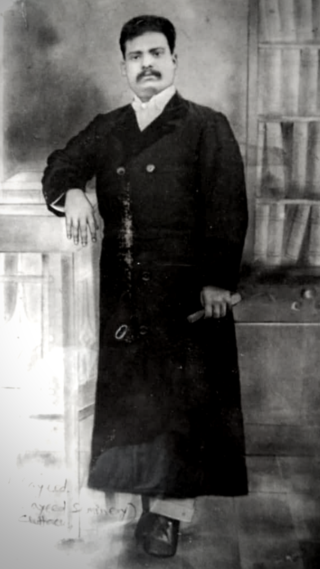
Sayeed Mohammed was an Indian Odia educationist, freedom fighter and philanthropist. In 1913, he founded the Moslem Seminary at Cuttack, which is regarded as the second nationalist school of Odisha. Sayeed is known for his activism against the British in the early 1900s. He was one of the prominent members of the Utkal Sammilani. In 1922, Sayeed along with Ekram Rasul co-founded the All Odisha Khilafat Committee, in the wake of the non-cooperation movement in India.
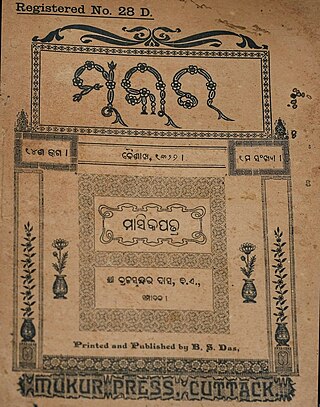
Mukura was a famous 20th century Odia magazine. It was founded by Brajasundar Das in 1906 in Cuttack, Odisha and was published for about 25 years, with its last issue in 1930. Brajasundar Das was the editor of this magazine. It cost Rs. 2 at the time.

Institute of Odia Studies & Research (IOSR) is a language research Institute. The mission of the institute is to develop Odia as a language of knowledge as well as of development. It is working for the establishment of a Central Institute Of Classical Odia as well as an Odia Biswabidyalaya. During the past ten years the institute has organised discussion groups, state and national level seminars and conference.

Sayeed Seminary School is a public school located in the heart of Cuttack city, India. It was established in 1913 by Sayeed Mohammed, a prominent Odia freedom fighter, scholar and educationist. The school is credited to be the second nationalist school of Odisha and is one of the two institutions bearing the name of Sayeed Mohammed, the other one being Sayeed Seminary Primary School, which is located within the campus of the former.

Acharya Harihar was a freedom fighter, teacher and social worker born to a Brahmin family in Sakhigopal in Puri District of Odisha. As a teacher of Satyabadi Bana Bidyalaya, he actively and successfully participated in the literary work of Satyabadi. He composed a translation of the Bhagavad Gita in Odia and children's grammar book in Odia language.
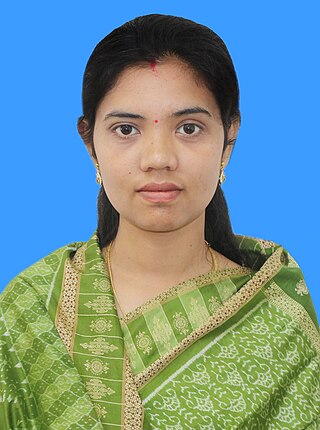
Barsha Singh Bariha is an Indian politician from the Biju Janata Dal representing the Padampur constituency in the Odisha Legislative Assembly.
















